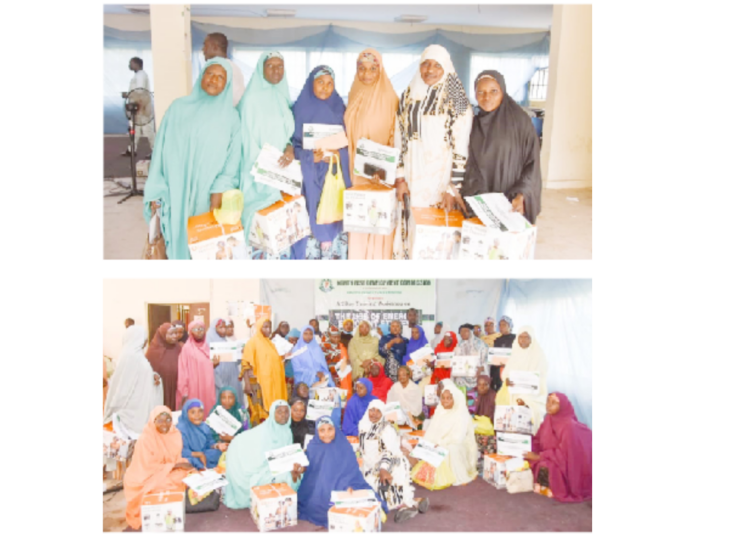‘The training has widened our perception about how we can contribute to ending deforestation through the use of clean energy sources’
These were the words of an elated Mrs Fatima, a resident of Bauchi metropolis who participated in an energy saving training by the Noth East Development Commission (NEDC).
Fatima who along others was trained on the use of efficient stoves to avoid deforestation and felling of trees, as well as reduce the use of generators for electrification for houses and businesses, noted that the importance of Burn Stove Classic Jikokoa provided to them by the Commission after the weeklong training held in Bauchi few months ago, could not be understated.
Mrs. Fatima recalled during an interview with the LEADERSHIP Newspaper in Bauchi recently that the stoves provided them after the training has not only been improving the efficiency of heat transfer from the cooking pot, saving fuel and reducing pressure on forest resources, but has also gone along way in reducing poverty among.citizens, especially the unemployed to which the training has been step down to them.
Among different reasons for the establishment of the North East Development Commission (NEDC) is to eradicate poverty that has become endemic in the North East following the activities of Boko Haram.
These criminals, aside from killing scores of the residents and destroying property worth millions of Naira, have through their acts of terrorism, forced alot of people to relocate to neighbouring states in search of safety. Their activities have also deprived the people of their age-long tratiditional farming through which they grow both good and cash crops for a living and even for commercial activities to ease livelihood.
It was in line with its mandates that the NEDC embarked on the training.
Speaking to LEADERSHIP, Mrs Fatima explained that the training and subsequent provision of starter packs for the trainees by the Commission will no doubt boost employment.
Another beneficiary of the training, Zuwairatu noted with delight that the use of energy efficient stoves could save over 40 percent of the Charcoal and significantly reduce toxic emission when compared to unconventional traditional Charcoal stoves, describing as very paramount the specialized training on the use and maintence of Burn Stove Classic introduced by the North East Development Commission.
She advised other trainees drawn from the six states of the sub-region to exhibit the greatest care in the use and management of the stoves provided them which, according to her, are aimed at improving the efficiency of heat transfer, safe fuel, reduce l pressure on felling forest trees, and invariably make them self-reliance.
The weeklong intensive training on the use of energy stove conducted in Bauchi almost seven months ago was enchored by specialized facilitators and erudiced consultants who positively impacted the skill knowledge on the participants drawn from the six states of Adamawa, Borno, Gombe, Yobe, Taraba and Bauchi the host state where they were taught on energy efficient cooking alternatives, understand how the climate is changing and adoptation of practice climate smart agriculture.
Participants were similarly exposed to the rudiments of saving energy homes in homes and reducing greenhouses gas emissions, reducing consumerism and cut down, and reducing waste matter, reuse, recycle cut-out single of plastic during the weeklong use of plastic during the impactful training held at the host state of Bauchi.
According to the Bauchi state coordinator of the Commission, Ibrahim Mohammed who played significant roles during the training conduct, noted that climate global training change has emerged as a challenge faced by every nation on the world.
Mohammed explained that Nigeria’s northeast exemplifies a typical extreme case of the country’s version of climate change, reveling in ecological imbalance and accompanied with devastating consequences.
He said, “It is evident that the northeast grapples with an unprecedented number of ‘climate induced migrations’ courtesy of the multifaceted climate change and its palpable effects; ranging from desertification, drought, flooding and the near disappearance of the Lake Chad basin, which collectively put the subregion in a dire strait.”
“We are seeing the effects of climate change that has exacerbated different conflicts in the North East, from the insurgency to communal conflicts over the years. The drying up of Lake Chad, the southward expansion of the Sahara Desert, floods being experienced across many states, menace of the herdsmen/farmers clashes necessitated by the diminishing availability of forests and grazing lands, are all obvious problems associated with climate change in the region.
One of the consultants, Hajiya Annesa Abdullahi Abubakar, who also spoke on the the training, said that climate change destabilizes the Earth’s temperature balance overtime and has serious consequences on human beings and the environment.
According to her, global warming is caused by the retention and increased concentration of greenhouse gases in the earth’s atmosphere, thereby leading to higher surface temperature of the earth, saying, about 1.4 billion people around the world (including several rural households in Nigeria) rely on traditional fuels like coal and wood to meet their basic energy needs.
“This is not only harmful to the environment but can also lead to premature deaths for millions of people, especially women and children.”
Annesa stated “As the global energy demand is projected to increase by more than 50% by 2035, it becomes very important that strategies are adopted at global, national, state, local government, and community levels in Nigeria to mitigate and adapt to the impacts of climate”.
A facilitator of the training, Mrs. Zainab Abubakar, said that charcoal from woodfuel is used as a domestic fuel for cooking and heating in many developing countries, stressing that even though wood extraction for the charcoal product as well as for firewood are one of the major drivers of deforestation and its associated challenges across Sub-saharan Africa, many households still use and depend on it for cooking.
She revealed that charcoal is generally better fuel for cooking than wood, as charcoal stoves tend to burn more than wood stoves, explained however that with energy efficient charcoal stoves replacing the traditional forms, cooking efficiency is significantly increased and the environmental impact of biomass use thereof is reduced.
Zainab said: “Charcoal from woodfuel is charred wood, which has lost most volatiles in the production process and has a low moisture content. Charcoal emits far less particles when burnt as compared to wood-fire, and is energy-dense light-weight (on energy value per weight), easy-to-handle, and therefore convenient fuel, which burns without producing much smoke other than during lighting.”
“These properties make charcoal a preferred fuel especially in urban and peri-urban areas. However, one disadvantage of wood charcoal is that the production process of charring is mostly inefficient”, she said, stressing “Energy efficient charcoal stoves can save between 30-50% of charcoal and reduce toxic emissions compared to unconventional traditional charcoal stoves, “That is why this specialized training on the use and maintenance of Burn Stove Classic is paramount.”
She called on the beneficiaries to take very good care of the Burn Stove Classic Jikokoa given to them for the purpose they were meant for, “Therefore, it is advisable that great care and attention is deployed for the use and management of cookstoves issued to us.”
At the graduation of the training participants, Mrs Fatima Usman from Ganjuwa Local Government Area of Bauchi state, spoke on behalf of the beneficiaries, where she said “We have significantly gained knowledge during the training exercise on how to use cookstoves to improve the efficiency of heat transfer to the cooking pot, saving fuel and reducing pressure on forest resources.
Mrs. Fatima Usman appreciated the North East Development Commission (NEDC) for having learned a lot from the training, as well as the Burn Stoves Classic Jikokoa and money given to them, and expressed confidence that the commission would not relent on it’s efforts of become women in the sub-region self-reliance, but the youths generally while eradicating poverty that has found home in the sub-rehion.
Malam Zaliha Halilu from Unguwar Sarakuna in Bauchi cosmopolitan area also chipped in to commend NEDC for the training which, she observed, has shown them the importance of energy efficient charcoal stoves in their homes, the Northeast and the country at large.
Zaliha said, “We go back home to be able to replicate or step down to others what we have judiciously learnt here in such a way we can collectively eradicate poverty in the North-East sub-region. We really got what the consultants and facilitators impacted in us”.
Zaliha Halilu simolarly thanked Consulting Integra Renewable Energy Services Ltd and Messrs Bhustan Energy and Renewable Services Ltd for providing the evenue of teaching them the use of efficient stove skill, and assured of stepping it down to others so that the entire Northeast would collectively benefit.
One of the core mandate of the Commission is to evolved policies and programmes designed to uplift the entire people.of the Northeast from the shackles of abject poverty which they have been thrown into as a result of the almost fourteen years of ravaging insurgency, which forced the national assembly sought for it’s establishment.





